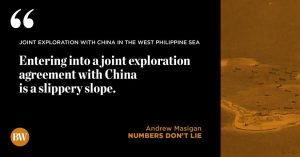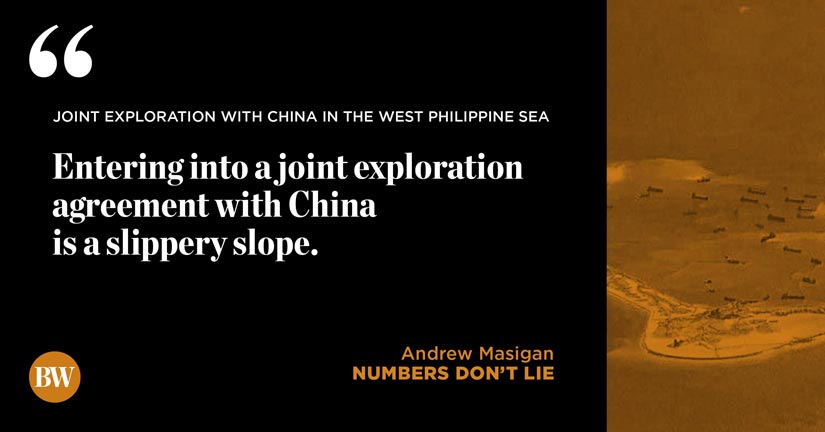June 17, 2018 | 9:55 pm


What is ours, is ours. This includes the trove of resources in the West Philippine Sea.
As I have written in this corner a few months ago, beneath the pristine waters of the West Philippine Sea lies an estimated 11 billion barrels of oil, 190 trillion feet of natural gas, and 10 percent of the world’s fishing resources. The sheer amount of natural resources is among the reasons why China covets our sovereign territory and those of Vietnam, Brunei, Taiwan, and Malaysia.
China has laid absolute claim to the entire stretch of the West Philippine Sea by asserting a territorial delineation called the nine-dash line. In reality, the nine-dash line is nothing but a vague, disjointed demarcation of domain that was first published in 1947. Fairly recent, in historical terms.
In recent years, China declared that it is expanding its claim to a ten-dash line which now includes the entire island of Taiwan. Only a country like China can make a “historical claim” pliable at its caprice.
China is a signatory of the United Nation’s convention of the Laws of the Seas, a global treaty among 120 nations. The treaty specifies that all waters, islands, and resources within 200 nautical miles from the shores of a particular nation’s mainland forms part of its domain or Exclusive Economic Zone (EEZ).
In a move to grab the territories from smaller claimants, China has defied this global treaty and militarized the area. Satellite images show that it has built a military airbase and naval base, complete with a refueling depot on Fiery Cross, Subi, and Mischief Reefs. Military grade radars were also erected in Cuarteron, Gaven, Johnson and Hughs Reefs. This enables China to monitor air and sea traffic in any point of the waters.
Since 2013, China began to assert its conjured sovereignty over the disputed area by requiring vessels, including those from the Philippines, to seek permission for passage and even to fish. Those who enter its nine dash line without clearance are bulldozed by heavily-armed patrol vessels. It is a ‘grab-by-force’ strategy that a typical playground bully would employ.
PRINCIPLED PRAGMATISM
President Duterte has opted to make a friend of China instead of being combative towards it. The idea is to get the most of the country’s aggressor without provoking it.
In diplomatic parlance, this is called “principled pragmatism,” a strategy designed to get maximum results from a delicate situation, without sacrificing anything. This is done by finding common ground of interest to build upon.
Clever nations around the world have employed principled pragmatism with spectacular results. President Duterte, however, has gotten flack for it.
The reason he gets flack is his own doing. In his attempt to befriend the playground bully, the President has resorted to over-the-top acts of accommodation and grandiose declarations of friendship which has spawned unease among the populace.
Shock waves rippled through the land when the President said that “China should turn the Philippines into a Chinese province.” These words were uttered before the Chinese Filipino Business Club.
To many, it was as if our own Chief Executive had already ceded the nation to its illegal invader. Malacañang’s spin doctors went on overdrive to tell us not to take the words of the President literally. Still, the populace took the President’s words to heart. Who can blame them? After all, he is still the President and his words reflect the sentiments of the state. His words cut deep, especially to the patriots among us.
The situation is exacerbated by the President’s relentless acts of flirtation towards China like a teenage boy raging with hormones.
We recall how, within the halls of the Chinese Parliament no less, he announced his separation from the United States and proposed a tri-axis of power between China, Russia, and the Philippines.
His standing orders to pedal softly and not assert our victory at the United Nations Permanent Court of Arbitration in the Hague (that deemed China’s nine-dash line invalid) does not inspire confidence either.
Recently, the Palace has allowed Chinese historical documentaries to air on PTV-4 to strengthen Chinese propaganda in our shores.
These acts, taken collectively, give the impression that Malacañang is playing on China’s team. Understandably, people have become insecure, worried, and scared. Again, the populace cannot be blamed.
This, however, is all part of the principled pragmatism strategy, albeit done in a uselessly exaggerated manner.
Beneath the hyperbolic acts of love by the President towards China is the intent to make the most out of the sticky situation we are in. Time will tell if the strategy pays off.
In the end, the strategy can only be deemed a success if the Philippines gets more trade concessions, more investments and more Official Development Assistance from China without sacrificing a speck of its sovereignty.
Recent developments, however, indicate that the strategy is yielding some favorable results.
During the Asian Forum in Hainan last April, Chinese President Xi Jinping committed to ensure stability and cooperation in the disputed area. It was further agreed that both nations would treat the disputed territories as a “sea of cooperation and friendship.”
If anything, Jinping’s statement assures us that China will exercise maximum restraint in the use of armed aggression, at least for now. It also assures us that a common ground of mutual benefit will be pursued.
JOINT EXPLORATION AND ITS CONSTITUTIONALITY
Talks have started to jointly explore and extract Liquid Natural Gas (LNG) in the West Philippine Sea. This is welcome news since our main source of LNG, Malampaya, will be depleted in 12 years, if not sooner. LNG from Malampaya supplies gas to three power plants with a collective capacity of 2,700 megawatts. It powers approximately 50% of Luzon’s power needs.
We need a new source of LNG soon and the West Philippine Sea has 190 trillion feet of it. With the declaration of the disputed area as a “sea of cooperation and friendship,” we are now free to tap this resource.
Joint exploration should not be seen a cessation of sovereignty, rather, it is an assertion of it. The West Philippine Sea and its resources belong to the Filipino people and it is our right to extract it.
This begs the question — since China is the encroacher and the Philippines is the encroached, is it safe and constitutional sound for the Philippines to jointly explore the disputed waters with China? The answer is yes, provided certain safeguards are put in place. These are the constitutional provisions pertinent to the issue:
Section 2, paragraph 4 of Article XII of the Constitution states that: “The President may enter into agreements with foreign-owned corporations involving either technical or financial assistance for large-scale exploration, development, and utilization of minerals, petroleum, and other mineral oils according to the general terms and conditions provided by law, based on real contributions to the economic growth and general welfare of the country. In such agreements, the State shall promote the development and use of local scientific and technical resources.”
The constitution further includes the proviso that “the exploration, development, and utilization of natural resources should be under the full control and supervision of the State.”
In other words, joint exploration can be pursued so long as the deal is governed not by a bilateral treaty but by a mere Commercial Agreement written under Philippine laws. It must explicitly identify the Philippine government as the owner of the resource and China as the technical partner that only provides capital and technology. The agreement must further state that absolute control and supervision of the resources belongs to the Philippines and that the agreement is only good for a fixed term, say 25 years.
This is the same agreement entered into by the Philippine government with Shell Philippines Exploration B.V. in the exploration and extraction of LNG in Malampaya. It has worked without complications.
In fact, another claimant to the disputed waters, Vietnam, has a standing joint exploration agreement with China National Offshore Oil Corporation. The Vietnamese are already benefiting from the resources of their part of the disputed waters. We should too.
Entering into a joint exploration agreement with China is a slippery slope. Done right, we can enjoy the resources of our territories without compromising our claims over it. Done wrong, the joint exploration can be construed as a cessation of territory. This is why we must follow the constitutional provisions to a tee.
What is ours, is ours. No entity should prevent us from benefitting from our own natural resources. Engaging in joint exploration with China, or any other nation for that matter, works to our best interest so long as constitutional safeguards are satisfied.
Andrew J. Masigan is an economist.
http://bworldonline.com/joint-exploration-with-china-in-the-west-philippine-sea/




